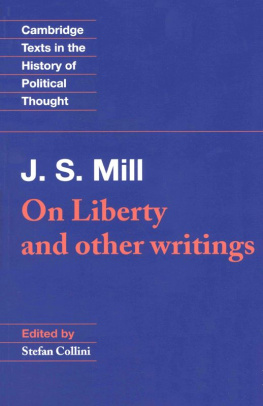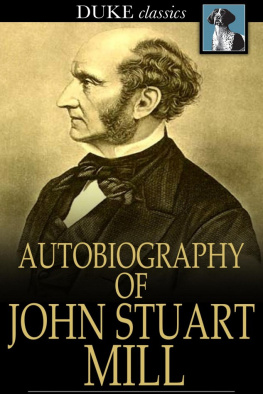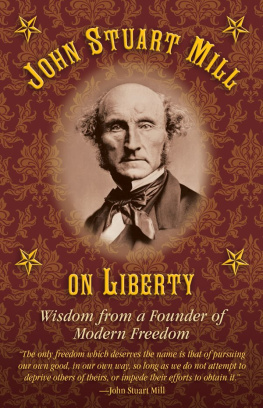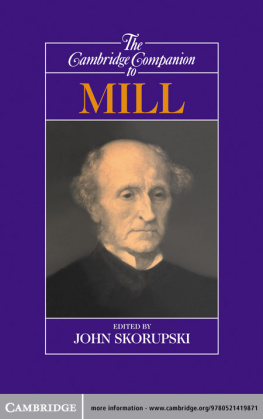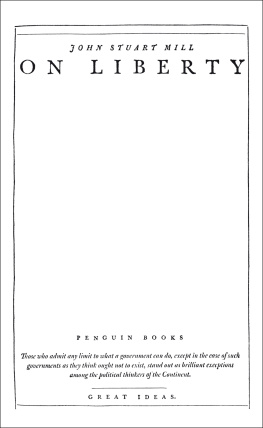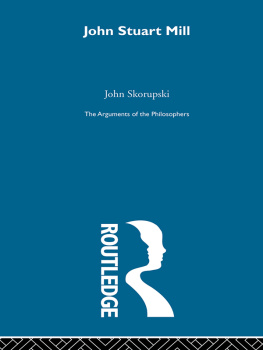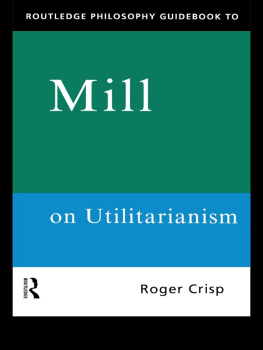Mill John Stuart - J. S. Mill: On Liberty and Other Writings
Here you can read online Mill John Stuart - J. S. Mill: On Liberty and Other Writings full text of the book (entire story) in english for free. Download pdf and epub, get meaning, cover and reviews about this ebook. City: Cambridge, year: 1989, publisher: Cambridge University Press, genre: Politics. Description of the work, (preface) as well as reviews are available. Best literature library LitArk.com created for fans of good reading and offers a wide selection of genres:
Romance novel
Science fiction
Adventure
Detective
Science
History
Home and family
Prose
Art
Politics
Computer
Non-fiction
Religion
Business
Children
Humor
Choose a favorite category and find really read worthwhile books. Enjoy immersion in the world of imagination, feel the emotions of the characters or learn something new for yourself, make an fascinating discovery.
- Book:J. S. Mill: On Liberty and Other Writings
- Author:
- Publisher:Cambridge University Press
- Genre:
- Year:1989
- City:Cambridge
- Rating:4 / 5
- Favourites:Add to favourites
- Your mark:
- 80
- 1
- 2
- 3
- 4
- 5
J. S. Mill: On Liberty and Other Writings: summary, description and annotation
We offer to read an annotation, description, summary or preface (depends on what the author of the book "J. S. Mill: On Liberty and Other Writings" wrote himself). If you haven't found the necessary information about the book — write in the comments, we will try to find it.
J. S. Mill: On Liberty and Other Writings — read online for free the complete book (whole text) full work
Below is the text of the book, divided by pages. System saving the place of the last page read, allows you to conveniently read the book "J. S. Mill: On Liberty and Other Writings" online for free, without having to search again every time where you left off. Put a bookmark, and you can go to the page where you finished reading at any time.
Font size:
Interval:
Bookmark:
CAMBRIDGE TEXTS IN THE
HISTORY OF POLITICAL THOUGHT
JOHN STUART MILL
On Liberty
WITH
The Subjection of Women
AND
Chapters on Socialism
HISTORY OF POLITICAL THOUGHT
Series editors
R AYMOND G EUSS
Professor in Philosophy, University of Cambridge
Q UENTIN S KINNER
Professor of the Humanities, Queen Mary, University of London
Cambridge Texts in the History of Political Thought is now firmly established as the major student textbook series in political theory. It aims to make available to students all the most important texts in the history of western political thought, from ancient Greece to the early twentieth century. All the familiar classic texts will be included, but the series seeks at the same time to enlarge the conventional canon by incorporating an extensive range of less well-known works, many of them never before available in a modern English edition. Wherever possible, texts are published in complete and unabridged form, and translations are specially commissioned for the series. Each volume contains a critical introduction together with chronologies, biographical sketches, a guide to further reading and any necessary glossaries and textual apparatus. When completed, the series will aim to offer an outline of the entire evolution of western political thought.
For a list of titles published in the series, please see end of book.
JOHN STUART MILL
WITH
The Subjection of Women
AND
Chapters on Socialism
EDITED BY
STEFAN COLLINI
University Lecturer in English
and Fellow of Clare Hall,
Cambridge

CAMBRIDGE UNIVERSITY PRESS
Cambridge, New York, Melbourne, Madrid, Cape Town, Singapore, So Paulo,
Delhi, Tokyo, Mexico City
Cambridge University Press
The Edinburgh Building, Cambridge CB 2 8 RU , UK
Published in the United States of America by Cambridge University Press, New York
www.cambridge.org
Information on this title: www.cambridge.org/9780521370158
in the introduction and ancillary editorial matter
Cambridge University Press 1989
First published 1989
8th printing 2012
Printed in the United Kingdom at the University Press, Cambridge
British Library Cataloguing in Publication data
Mill, John Stuart, 18061873
On liberty; with, The subjection of women
and, Chapters on socialism.
(Cambridge texts in the history of political thought)
I. English philosophy
I. Title
192
Library of Congress Cataloguing in Publication data
Mill, John Stuart, 18061873.
[Selections. 1989]
On liberty: with, The subjection of women;
and Chapters on socialism/John Stuart Mill;
edited by Stefan Collini.p. cm.
(Cambridge texts in the history of political thought)
Bibliography.
Includes index.
ISBN 0 521 37015 9 (hardback) ISBN 0 521 37917 2 (paperback)
I . Liberty. 2. Womens rights. 3. Equality. 4. Socialism.
I. Collini. Stefan, 1947. II. Title. III. Title: On liberty.
IV. Title: Subjection of women. V. Series.
JC585.M74 1989
323.44 dc 198838426 CIP
ISBN 978-0-521-37917-5 Paperback
Cambridge University Press has no responsibility for the persistence or accuracy of URLs for external or third-party internet websites referred to in this publication, and does not guarantee that any content on such websites is, or will remain, accurate or appropriate. Information regarding prices, travel timetables and other factual information given in this work are correct at the time of first printing but Cambridge University Press does not guarantee the accuracy of such information thereafter.
John Stuart Mills On Liberty is one of the few indisputably classic texts in the history of political thought. Its interpretation has, like that of most works which posterity promotes to classic status, been the subject of sustained debate and often fierce controversy since its first publication in 1859, but whatever the nature of the disagreements it has never seemed less than the single most eloquent, most significant, and most influential statement of the irreducible value of human individuality. Other works of political theory, such as John Lockes Two Treatises on Government (published in 1689), may be regarded as the foundation statement of the liberal principle that government must rest on the consent of the governed; others still, such as Adam Smiths Wealth of Nations (1776), may be credited with the most systematic exposition of the general economic benefit of leaving individuals alone to pursue their self-interest. But insofar as liberalism in the modern world could be said to acknowledge one text as setting out its essential moral basis, several generations of readers have concurred in according that primacy to On Liberty.
Mill is in fact the author of several other works which have been admitted to the modern canon of the history of political thought, and of those it is The Subjection of Women (1869) which commands most attention today. Mary Wollstonecrafts passionate Vindication of the Rights of Woman (1792) or Friedrich Engels more sociological (and very doubtfully feminist) The Origin of the Family, Private Property, and the State (1884) have both retained a select band of admirers, but no other work written before the mid twentieth century has been recognised as offering such a powerful and persuasive indictment of the systematic injustice in the social, economic, and political position of women. As in On Liberty, the values of human dignity, freedom, and self-development provide the foundation for Mills attack on existing social arrangements, and it is these values which underlie his sympathetic but ultimately sceptical analysis of what has become the great rival political theory to liberalism in the modern world, namely socialism. Mills Chapters on Socialism constitute the first part of a projected book on the subject which was left unfinished at his death. Partly for that reason, it has remained one of the less celebrated of Mills works, but it addresses from a different angle several of the issues raised by the other two books reprinted in this volume. The three taken together thus provide a particularly accessible and compact introduction to what remains distinctive and attractive about Mill as a political thinker.
Any summary of Mills life must begin by acknowledging that, unlike any other major political theorist (with the arguable exceptions of St Augustine and Rousseau), he wrote an autobiography which has become one of the minor classics of the genre, above all on account of its dispassionate yet oddly moving account of the remarkable experiment in education to which the young Mill was subject. He was born in 1806 at Pentonville, then on the outskirts of London. His father, James Mill, was a friend and close political associate of the Utilitarian philosopher and radical reformer Jeremy Bentham. Among their shared beliefs was the conviction that far more could be achieved by rigorous education than was conventionally recognised, and so James Mill undertook his eldest sons education entirely at home. (Thus, the future author whose works have figured on syllabuses in several subjects at colleges and universities around the world never formally attended an educational establishment of any kind.) He began to learn Greek at the age of three, was introduced to logic at twelve, and by his early teens was set to summarise articles in political economy. In one sense the educational experiment was a great success, turning the young Mill into an extremely efficient reasoning machine (as he later described himself at this stage of his development). While still in his teens, the younger Mill began writing newspaper and periodical articles forcefully expounding his fathers somewhat doctrinaire political radicalism.
Next pageFont size:
Interval:
Bookmark:
Similar books «J. S. Mill: On Liberty and Other Writings»
Look at similar books to J. S. Mill: On Liberty and Other Writings. We have selected literature similar in name and meaning in the hope of providing readers with more options to find new, interesting, not yet read works.
Discussion, reviews of the book J. S. Mill: On Liberty and Other Writings and just readers' own opinions. Leave your comments, write what you think about the work, its meaning or the main characters. Specify what exactly you liked and what you didn't like, and why you think so.

